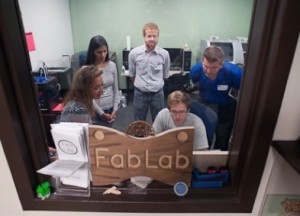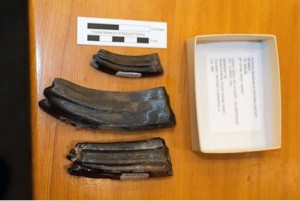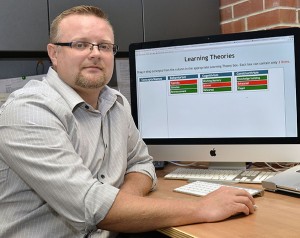Education professor wins $1.2 million grant to lead UF team on 3-D paleontology technology project
University of Florida educational technology researcher Pasha Antonenko is leading a team of UF scientists from multiple disciplines to create a novel curriculum for the middle and high school grades and assist paleontologists working on projects worldwide.
The three-year, $1.2 million project will help students develop their skills in real-world science technology, engineering and mathematics (STEM), Antonenko said. It is a collaboration with teachers and students in 10 public schools in California and Florida. Among the participating schools is UF’s P.K. Yonge Development Research School. The other schools are yet to be determined.

Workshop participants visit the University of Florida’s Fab Lab to print a model of a fossil horse tooth.

A comparison of the fossil tooth (top) with the scaled printed version (center).The printed 3D model was enlarged to twice the size of the original fossil to demonstrate how scan data can be manipulated to facilitate specific lesson plans. In this case, the differences in the teeth of two fossil horses (another shown at bottom) of very different sizes could be compared after scaling the small horse to the size of the larger horse, potentially serving as a lesson in critical observation skills.
The NSF grant is one of five that the Ukraine-born Antonenko has won in recent months.
Called “iDigFossils,” the project will allow middle- and high-school students who are studying bones to scan them in three dimensions and upload them to virtual collections that paleontologists and others can access worldwide and reproduce using 3-D printers.
Antonenko is an associate professor of educational technology in UF’s College of Education.
He said the team is seeking to address an ongoing problem in 21st century education: how to integrate STEM lessons across multiple disciplines. For example, how do you take what lessons students are learning in math classes and apply them to other fields of study, such as biology?
“The problem that we are addressing is to integrate STEM in the classroom in effective ways without overloading the mathematics teacher or the science teacher,” he said.
More specifically the project will use 3-D scanning and printing activities in the context of paleontology as an integrative STEM discipline, he said. “It will provide a good way to integrate STEM in K-12 education. It’s a very meaningful way to also contribute to actual science, that’s the other angle of it.”
About $100,000 of the funding will pay for 3-D scanning and printing carts and five laptops for each of 10 participating school districts.
Antonenko is serving as principal investigator on the project. Co-principal investigators are: Bruce McFadden, curator and professor at UF’s Florida Museum of Natural History; Aaron Wood, research assistant at the museum; and Corey Toler-Franklin, an assistant professor in UF’s Computer & Information Science & Engineering Department and director of its Graphics, Imaging & Light Measurement Laboratory.
More information can be found on the NSF website: http://www.nsf.gov/awardsearch/showAward?AWD_ID=1510410&HistoricalAwards=false.
Source: Pasha Antonenko, (352) 273-4176
Writer: Charles Boisseau, (352) 273-4449
Media Liaison: Larry Lansford, (352) 273-4137





